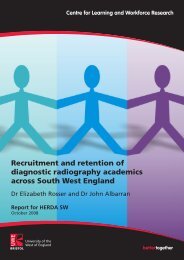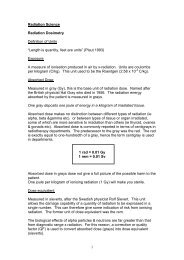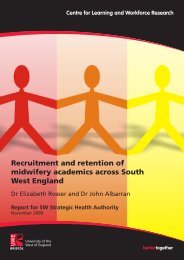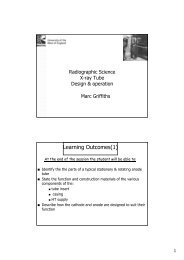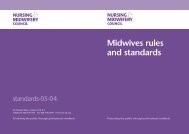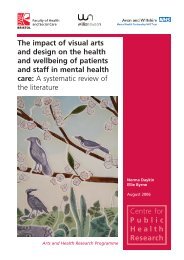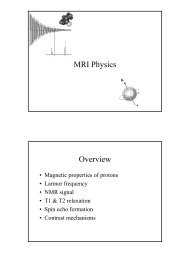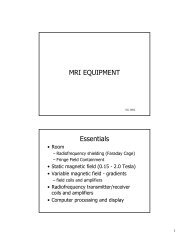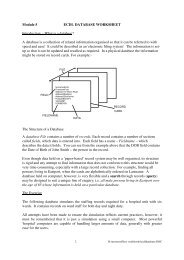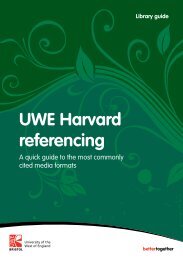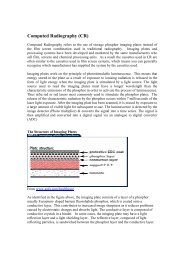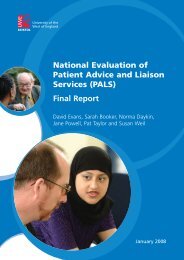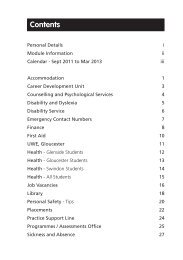The impact of arts on health and wellbeing of young people: a ...
The impact of arts on health and wellbeing of young people: a ...
The impact of arts on health and wellbeing of young people: a ...
You also want an ePaper? Increase the reach of your titles
YUMPU automatically turns print PDFs into web optimized ePapers that Google loves.
<str<strong>on</strong>g>The</str<strong>on</strong>g> data were collected using a structured self completi<strong>on</strong> questi<strong>on</strong>naire that<br />
focused <strong>on</strong> what were viewed as attitude determinants for behaviour change<br />
including knowledge about HIV/AIDS, attitudes to risk, attitudes towards<br />
<strong>people</strong> with AIDS <strong>and</strong> preventive behaviour. <str<strong>on</strong>g>The</str<strong>on</strong>g> data were analysed with<br />
input by medical researchers in the UK Public Health Laboratory Service.<br />
This analysis focused mainly <strong>on</strong> attitudes <strong>and</strong> knowledge <strong>and</strong> excluded self<br />
reported behaviour change. It used a grading <str<strong>on</strong>g>of</str<strong>on</strong>g> three ‘correctness’ scores<br />
<strong>and</strong> the change in mean scores from pre to post-interventi<strong>on</strong> surveys was<br />
measured to assess the influence <str<strong>on</strong>g>of</str<strong>on</strong>g> the interventi<strong>on</strong>.<br />
<str<strong>on</strong>g>The</str<strong>on</strong>g> reported results included significant increases in knowledge about<br />
HIV/AIDS in both the DramAide <strong>and</strong> booklet interventi<strong>on</strong> schools, with a<br />
greater increase that was statistically significant in the former group. In<br />
relati<strong>on</strong> to attitudes about HIV/AIDS, mean scores increased in the DramAide<br />
interventi<strong>on</strong> schools but showed no evidence <str<strong>on</strong>g>of</str<strong>on</strong>g> change in the booklet<br />
interventi<strong>on</strong> schools. Analysis <str<strong>on</strong>g>of</str<strong>on</strong>g> self reported behaviour showed some<br />
changes, including increased reported c<strong>on</strong>dom use, in students in the<br />
DramAide interventi<strong>on</strong> schools although these changes were not statistically<br />
significant. <str<strong>on</strong>g>The</str<strong>on</strong>g> authors c<strong>on</strong>clude that drama interventi<strong>on</strong> can lead to<br />
significant improvements in knowledge <strong>and</strong> particularly attitudes to HIV/AIDS.<br />
<str<strong>on</strong>g>The</str<strong>on</strong>g> limitati<strong>on</strong>s <str<strong>on</strong>g>of</str<strong>on</strong>g> the study are discussed: these include the inability to link<br />
individual resp<strong>on</strong>ses due to the an<strong>on</strong>ymous nature <str<strong>on</strong>g>of</str<strong>on</strong>g> the questi<strong>on</strong>naire, a<br />
high attriti<strong>on</strong> rate which allowed c<strong>on</strong>siderable potential for bias <strong>and</strong> reliance<br />
<strong>on</strong> self report measures. Nevertheless, the high resp<strong>on</strong>se rate within schools<br />
(over 90%), the c<strong>on</strong>sistency <str<strong>on</strong>g>of</str<strong>on</strong>g> results <strong>and</strong> the r<strong>and</strong>omised design all<br />
c<strong>on</strong>tribute to the validity <str<strong>on</strong>g>of</str<strong>on</strong>g> the findings.<br />
Evidence by Denman et al. (1995) also supports the claim that drama can<br />
lead to improved knowledge <strong>and</strong> changes in attitude in relati<strong>on</strong> to HIV/AIDS.<br />
This c<strong>on</strong>trolled study examined the effects <str<strong>on</strong>g>of</str<strong>on</strong>g> a drama programme focusing <strong>on</strong><br />
HIV/AIDS in 12 UK sec<strong>on</strong>dary schools. <str<strong>on</strong>g>The</str<strong>on</strong>g> children were divided into an<br />
interventi<strong>on</strong> group <str<strong>on</strong>g>of</str<strong>on</strong>g> 252 who took part in a <str<strong>on</strong>g>The</str<strong>on</strong>g>atre in Educati<strong>on</strong> Programme<br />
focusing <strong>on</strong> HIV <strong>and</strong> AIDS entitled ‘Some<strong>on</strong>e Like You’ <strong>and</strong> a c<strong>on</strong>trol group <str<strong>on</strong>g>of</str<strong>on</strong>g><br />
428. Following the interventi<strong>on</strong>, the experimental group showed significantly<br />
bigger gains in knowledge than the c<strong>on</strong>trol group <strong>and</strong> also showed<br />
significantly greater shifts in attitude. Hence the authors c<strong>on</strong>clude that the<br />
drama programme improved knowledge levels <strong>and</strong> influenced the attitudes <str<strong>on</strong>g>of</str<strong>on</strong>g><br />
the children participating in the initiative.<br />
Research by Elliott et al. (1996) does not support claims that theatre has a<br />
positive <str<strong>on</strong>g>impact</str<strong>on</strong>g> <strong>on</strong> HIV knowledge <strong>and</strong> attitudes, although the research does<br />
indicate that theatre may influence some reported behaviours. This c<strong>on</strong>trolled<br />
study <str<strong>on</strong>g>of</str<strong>on</strong>g> the effects <str<strong>on</strong>g>of</str<strong>on</strong>g> theatre in HIV/AIDS educati<strong>on</strong> <strong>on</strong> knowledge, attitudes<br />
<strong>and</strong> risk behaviour involved <strong>young</strong> <strong>people</strong> in ten youth projects in socially<br />
deprived areas <str<strong>on</strong>g>of</str<strong>on</strong>g> Glasgow. <str<strong>on</strong>g>The</str<strong>on</strong>g> research compared a theatre producti<strong>on</strong> <strong>on</strong><br />
HIV with a st<strong>and</strong>ard group based <strong>health</strong> educati<strong>on</strong> seminar. Self completi<strong>on</strong><br />
questi<strong>on</strong>naires were completed prior to the interventi<strong>on</strong> <strong>and</strong> two m<strong>on</strong>ths<br />
afterwards. <str<strong>on</strong>g>The</str<strong>on</strong>g> questi<strong>on</strong>naires were based <strong>on</strong> st<strong>and</strong>ard tools used in<br />
previous research. A total <str<strong>on</strong>g>of</str<strong>on</strong>g> 132 <strong>young</strong> <strong>people</strong> attended a theatre<br />
13



